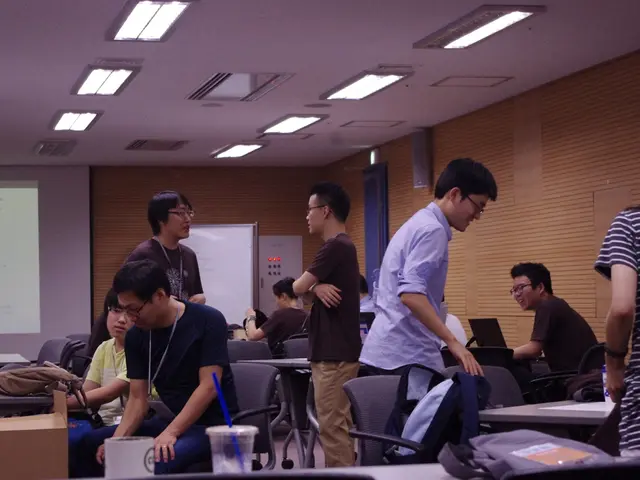Transforming the Body's Defenses: A Path to Internal Balance
Busting Allergies: A Journey Towards Rebalance
Got the sniffles every spring? Struggling to breathe at your favorite pet's house? Allergies can feel like a body betrayal, an unpredictable dance with everyday elements. But what if these reactions aren't a flaw, but a signal? A call to rebalance more than just the immune system, but your relationship with your body. We're diving into allergy immunotherapy, a treatment with potential far beyond the nose.
The Lowdown on Allergy Immunotherapy
Allergy immunotherapy, or reconditioning the immune system to respond less aggressively to certain triggers, has been gaining ground. Through injections, sublingual drops, or tablets, it introduces minute amounts of allergens to train the body to develop a more balanced reaction.
According to the National Center for Biotechnology Information, immunotherapy can significantly reduce or eliminate allergic symptoms and, in many cases, provide long-lasting relief. It stands out as the only disease-modifying therapy for allergies, working at the source, not just masking them.
But how does it actually work? In allergic individuals, the immune system produces IgE antibodies, triggering a cascade of chemicals leading to inflammation, irritation, and other familiar symptoms. By exposing the body to controlled amounts of these allergens, the immune system learns to suppress IgE production and increase the production of IgG, decreasing the risk of overreactions.
The Immune System as a Mirror
Allergies can become a reflection of unresolved stress or disbalance. As the immune system remains in a hyperactive state, it's worth questioning: what in our lives feels unsafe, overwhelming, or imbalanced?
Although allergies aren't caused by emotional trauma, the chronic stress of coping with them can amplify the body's sensitivity, both physically and mentally. Many long-term allergy sufferers inhabit a state of constant vigilance—reading food labels, mapping safe zones, forgoing events that feel perilous.
This continuous watchfulness isn't just exhausting. It reinforces a message to the nervous system: the world is threatening. Bodily responses cannot be trusted, and we must adapt accordingly.
Immunotherapy introduces a physical reprieve from this cycle. But what if it were bolstered by emotional healing too?
Emotional Backing: Mind-Body Techniques to Accompany Your Journey
Immunotherapy is a gradual, intentional process. Support your inner and outer healing as your immune system adapts with these mind-body practices:
Coordinated Breathing & Presence
Your breath is your most immediate tool to regulate your nervous system. Practices like coherent breathing (inhale for 5, exhale for 5) can gently signal safety and help downshift your stress response—even when you're not fully aware of it.
Creative Tracking
Instead of solely measuring progression based on symptoms, try journaling, sketching, or even voice-noting your experiences. What changes are awakening? What stories about your body are transforming?
Teamwork with Your Body
Can you move from treating your body as a broken entity needing repair to partnering with it for holistic growth? Immunotherapy invites a dialogue, not domination. Approach this process with more gentle listening, curiosity, and celebration of every small step as proof of your body's remarkable adaptability.
Memorizing Safety: A Careful Re- education
At its core, allergy immunotherapy is a slow, cellular reawakening. It's the immune system reconnecting with a sense of calm, no longer overreacting, and developing discernment.
Isn't that what many of us are striving for—an alternative response to fearful reactions, a shift from avoidance to trust?
Whether it's healing from emotional trauma, embracing new patterns, or seeking ease in life, we're all working on retraining parts of ourselves. Immunotherapy demonstrates that meaningful change doesn't happen overnight. It takes commitment, consistency, and a willingness to listen. Just like transforming the body's reaction to allergens, encouraging emotional healing is a commitment to understanding your body at its core, and working towards a deeper harmony.
- Allergy immunotherapy, with its potential to recondition the immune system, can be seen as a mirror for personal growth and emotional healing, as it works to establish a more balanced response – a transformation that echoes the journey towards mental health and personal growth.
- Embracing mind-body techniques during the process of immunotherapy can support not just physical healing, but also emotional healing, promoting a collaboration with the body instead of treating it as a broken entity needing repair – an approach aligning with the principles of education and self-development.
- immunotherapy serves as a testament to the power of steady commitment and dedicated practice in fostering change at the cellular level, reflecting the journey towards health and wellness that often requires long-term dedication, persistence, and self-awareness regarding one's emotional state and well-being.







